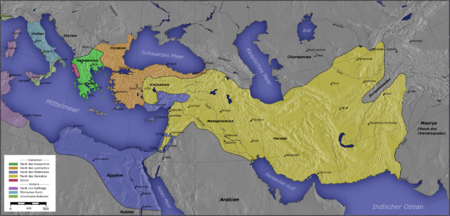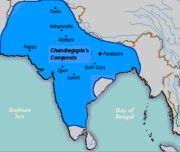290s BC
During the 290s BC, Hellenistic civilization begins its emergence throughout the successor states of the former Argead Macedonian Empire of Alexander the Great resulting in the diffusion of Greek culture throughout the Ancient world and advances in Science, mathematics, philosophy and etc. Meanwhile, the Roman Republic is embroiled in war against the Samnites, the Mauryan Empire continues to thrive in Ancient India, and the Kingdom of Qin in Ancient China, the one which in the future will conquer its adversaries and unite China, begins to emerge as a significant power during the Warring States Period.
| Millennium: | 1st millennium BC |
| Centuries: | 4th century BC – 3rd century BC – 2nd century BC |
| Decades: | 320s BC 310s BC 300s BC – 290s BC – 280s BC 270s BC 260s BC |
| Years: | 299 BC 298 BC 297 BC 296 BC 295 BC 294 BC 293 BC 292 BC 291 BC 290 BC |
| Categories: | Births – Deaths – Architecture Establishments – Disestablishments |

Contents |
Events and trends
- 299 BC- King Wuling of Zhao abdicates the throne of Zhao (in Ancient China) to his son.
- 299 BC- King Huai of Chu is captured after an overwhelming victory by the kingdom of Qin.
- 298 BC- The Samnites defeat the Romans under Lucius Cornelius Scipio Barbatus in the Battle of Camerinum, first battle of the Third Samnite War.
- 298 BC- The Romans capture the Samnite cities of Taurasia, Bovianum Vetus and Aufidena.
- 298 BC- Ptolemy gives his stepdaughter Theoxena in marriage to Agathocles, the tyrant of Syracuse (in south-eastern Sicily).
- 298 BC- Ptolemy finally brings the rebellious region of Cyrene under his control.
- 298 BC- Bindusara succeeds his father Chandragupta Maurya as emperor of the Mauryan Empire.

Chandragupta extended the borders of the empire southward into the Deccan Plateau circa 300 BC.[1]
- 297 BC- Kingdom of Bithynia (in modern day Turkey) is established.
- 297 BC- Fabius Maximus Rullianus elected Consul for a fourth term.
- 297 BC- Samnites defeated in battle near tifernum by Consul Fabius Maximus Rullianus.
- 297 BC- Antipater II, ruling jointly with Alexander V, succeed the briefly reigning Philip IV who inturn succeeded King Cassander of Macedon.
- 297 BC- Demetrius Poliorcetes, the future King Demetrius I of Macedon, returns to Greece.
- 297 BC- Lysimachus seizes Demetrius Poliorcetes's possessions in Asia Minor.
- 297 BC- Ptolemy I of Egypt restores Pyrrhus of Epirus to his throne.
- 297 BC- Chandragupta Maurya converts to Jainism.
- 296 BC- Ptolemy I makes peace with Demetrius Poliorcetes, to whom he betrothes his daughter Ptolemais.
- 296 BC- The temple to Bellona is erected on the Capitoline Hill in Rome.
- 295 BC- Battle of Sentinum during the Third Samnite War.
- 295 BC- Demetrius Poliorcetes captures Athens.
- 295 BC- Thessalonica, mother of Antipater II, is executed by order of the latter.
- 294 BC- King Archidamus IV of Sparta is defeated by Demetrius Poliorcetes in battle near Mantinea.
- 294 BC- Demetrius Poliorcetes takes the throne of Macedon during a dynastic struggle between Antipater II and Alexander V.
- 294 BC- Pyrrhus of Epirus captures areas along the western frontier of Macedon.
- 294 BC- Lysimachus concludes a peace with Demetrius Poliorcetes whereby Demetrius Poliorcetes is recognized as ruler of Macedonia.
- 294 BC- Ptolemy I gains control over Cyprus and the Phoenician coastal towns of Tyre and Sidon.
- 294 BC- Marriage of Stratonice and Antiochus (future king of the Seleucid empire).
- 294 BC- Demetrius I founds Demetrias (near modern day Volos.
- 293 BC- Battle of Aquilonia during the Samnite Wars.
- 293 BC- Rome suffers from the plague. The worship of Aesculapius is introduced from Epidaurus to Rome in the hope of averting the plague.
- 293 BC- Prince and future king Antiochus I of the Seleucid empire is given command of territories west of the Euphrates river.
- 293 BC- Battle of Yique in Ancient China between the kingdom of Qin against the kingdoms of Wei and Han.
- 292 BC- Lysimachus of Thrace is captured shortly after an unsuccessful expedition north of the Danube. Lysimachus later concludes an agreement with Dromichaetes of Dacia.
- 292 BC- Prince and future king Antigonus II suppresses a rebellion in Boeotia.
- 291 BC- Demetrius I captures Thebes.
- 291 BC- The Romans storm and take the Samnite city of Venusia.
- 290 BC- The Samnites are defeated, ending the Third (and last) Samnite War. As a result, Samnite territories are annexed but they gain roman citizenship, albeit civitas sine suffragio ("citizenship without the right to vote").
Map showing Roman expansion in Italy.
- 290 BC- The Port city of Berenice is built in honor of Ptolemy I's wife Queen Berenice I.
Significant people
- Nan, Zhou dynasty king of China, r. 314–256 BC
- Perunar killi, King of the Chola Empire, r. 316-286 BC
- Huai, King of Chu, r. 328–299 BC
- Qingxiang, King of Chu, r. 299–263 BC
- Qu Yuan, poet, scholar, and minister from Chu
- Ptolemy I, Pharaoh of Egypt, r. 305–285 BC
- Euclid of Alexandria, mathematician and "Father of Geometry"
- Onias I High-Priest of Israel, held position 320–280 BC
- Neoptolemus II, King of Epirus, r. 302–297 BC
- Pyrrhus I, King of Epirus, r. 307–302, 297–272 BC
- Kōan, Legendary Emperor of Japan, r. 392–291 BC
- Kōrei, Legendary Emperor of Japan, r. 291–215 BC
- Cassander, King of Macedon, r. 305–297 BC
- Philip IV, King of Macedon, r. 297 BC
- Alexander V and Antipater II, co-kings of Macedon r. 297–294 BC
- Demetrius I, King of Macedon, r. 294–288 BC
- Epicurus, Greek philosopher (founder of Epicureanism)
- Chandragupta Maurya, Mauryan dynasty Emperor of India, r. 322–298 BC
- Bindusara, Mauryan dynasty Emperor of India, r. 298–272 BC
- Chanakya, Mauryan Prime Minister
- Zhaoxiang, King of Qin, r. 307–251 BC
- Bai Qi, Qin general
- Lucius Cornelius Scipio Barbatus, Roman Consul and general, in office 298 BC
- Publius Decius Mus, Roman Consul, in office 312, 308, 297, 295 BC
- Fabius Maximus Rullianus, Roman Consul, in office 322, 310, 308, 297, 295 BC
- Gellius Egnatius, leader of the Samnites during the Third Samnite War
- Seleucus I, King of the Seleucid Empire, r. 305–281 BC
- Antiochus, Prince, commander of western territories, and future king of the Seleucid Empire
- Berossus of Babylon, astronomer and writer
- Megasthenes, traveller, geographer, and Seleucid ambassador to the Mauryan Empire
- Areus I (Agaid king) r. 309–265 and Archidamus IV (Eurypontid king) r. 305–275 BC, Co-kings of Sparta
- Agathocles, Tyrant of Syracuse, in office 317–289 BC
- Lysimachus, King of Thrace and Asia Minor, r. 306 BC (Thrace), 301 BC (Asia Minor)–281 BC (both)
- Wuling, King of Zhao, r. 326–299 BC
- Huiwen, King of Zhao, r. 299–266 BC
Births
- 299 BC- Lyco of Troas, philosopher
- c.295 BC- Arsinoe I of Egypt, Queen
- 291 BC- Lü Buwei, Statesman of the Kingdom of Qin
- 290 BC- Lucius Caecilius Metellus, Roman statesman
Deaths
- 299 BC-Titus Manlius Torquatus, Roman Consul.
- c.297 BC- Chandragupta Maurya, Emperor of the Maurya Empire in India, r. 322–298 BC [2]
- 297 BC- Cassander, King of Macedon, r. 305–297 BC.
- 297 BC- Philip IV, king of Macedon r. 297 BC
- 295 BC- Thessalonica of Macedon, Macedonian Queen
- 295 BC- Publius Decius Mus, Roman consul
- 295 BC- Zhuangzi, Chinese philosopher
- 295 BC- King Wuling of Zhao, king of the Chinese State of Zhao
- 295 BC- Gellius Egnatius, leader of the Samnites during the Third Samnite War
- 294 BC- Alexander V, king of Macedon, r. 297–294 BC.
- 294 BC- Marsyas of Pella, historian
- 291 BC- Menander, Athenian dramatist
- 291 BC- Dinarchus of Athens, logographer (speech writer)
- 290 BC- Autolycus of Pitane, astronomer, mathematician, and geographer
- c.290 BC- Megasthenes, Greek traveller and geographer
- 290 BC- Onesicritus of Astypalaia, historical writer
References
-
- ↑ Radhakumud Mookerji (1988). Chandragupta Maurya and His Times (p. 39). Motilal Banarsidass Publ. ISBN 8120804058.